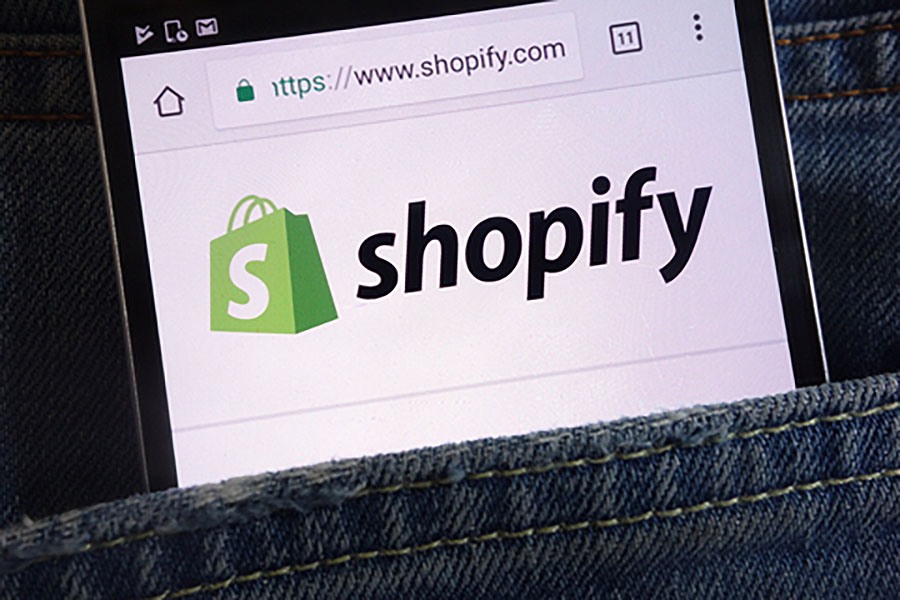Been selling on eBay for a long time? Heard about Shopify, and considering taking a leap of faith and signing up?
It may be time. There are a lot of reasons why it makes sense for eBay sellers to also offer their products for sale on Shopify. Here are five of them.

Shopify is proving to be a formidable place to build a brand with lifestyle shoppers—a hard thing to do on eBay alone. (Image: © Piotr Swat / Dreamstime)
1. You want to build your brand.
Let's face it—when you sell on eBay, most of your shoppers see themselves as engaging in a transaction with eBay.
Yes, you can go out of your way to customize every customizable tweak on your listings and on your eBay store, but as eBay brings more and more of their workflows in-house, and as they shift traffic away from item descriptions and toward product pages, there's less room for branding.
If you want your business to grow as your business, and not just as a part of eBay's inventory, you're going to need to grab a patch of netland for yourself. Shopify is the easiest place to do that.
On Shopify, you'll be able to create your pages structured your way and centered entirely around your brand. Yes, traffic will be lower at first, and you'll want to keep that steady stream of eBay sales flowing, but over the long term, there's far more room on Shopify to be an entrepreneur, rather than just a seller.
2. You'd like to earn more on repeat sales.
On a related note, how nice would it be to own your own customers?
It's easy to feel as though a sale on eBay is worth the fees the first time someone buys from you. Your fees are good money that you've spent well, to reach a larger audience.
But the second time someone buys from you? The third? This person is already a loyal customer, so it can feel more than a bit irritating to pay eBay fees to continue to reach them.
With a Shopify store promoted in your fulfillment package, you can drive repeat shoppers directly to you, cutting out the marketing middleman. You can even offer discounts relative to your eBay pricing, since you won't have to cover fees.
3. You think content marketing and other types of marketing can boost your sales.
Content marketing—things like blogging, YouTube videos, and other kinds of community-oriented engagement to rave about your products and the lifestyle that they enable—is an awkward fit with eBay.
eBay just isn't for that, and it doesn't offer much in the way of help to do that. It feels just as awkward to your readers or viewers to click through to an eBay page as it does for you to create the link in the first place.

Contnent marketing can be a growth driver—but it sits uncomfortably at best with eBay. On Shopify? It's natural. (Image: © Piotr Swat / Dreamstime)
On Shopify, on the other hand, your blog and videos can be far more deeply and thematically integrated with your store. You also own your own marketing, and can adopt a variety of marketing and advertising strategies that just don't sit well with links to eBay listings.
So if you'd like to own your own marketing and have it play well with your inventory, adding Shopify is the obvious route to travel.
4. You've reached an eBay sales plateau.
Sellers that are making money on eBay don't want to leave eBay, naturally—there's no sense in cutting off a healthy revenue stream.
At the same time, many sellers know the feeling of the "eBay plateau." Sales grew and grew for a while—and then they didn't any longer. No matter what you try, you don't seem to be able to restore the eBay growth trajectory that you once had. You're stagnating.
One solution to this problem is to add an entirely new base of customers and entirely new way to buy your products. Shopify can be that way. Rather than trying to squeeze every last additional bit out of eBay's shopping audience, you open yourself up to the entire internet, including the decent number of shoppers that make it a personal policy not to shop on eBay for whatever reason.
5. You're increasing your focus on private-label products.
Private-label products can be an exciting gambit for a seller, particularly if you're also interested in customizing your own products. For many growing sellers, this feels like an entirely new level of "being in business for yourself."
Now you have your own product line, featuring your own branding, in colors and configurations that nobody else has. Great!
But you're selling them in crowded eBay categories full of tens of thousands of other listings, many of them similar, and as we saw above, there's limited potential for your brand to resonate.
If this is you, it's a good time to open a Shopify store as well. No, don't give up on your eBay revenue stream, but put your private-label and custom products somewhere else where they aren't lost in the noise.
You can use Shopify to deliver your "premium" experience and your exclusive products to non-eBay audiences that are less likely to be purely price-driven.
Hundreds of Other Reasons
These are five reasons, but of course there are hundreds of others, and thousands and thousands of sellers that make their living every day selling both on eBay and Shopify.
If the reasons above resonate with you, it's time to consider taking the leap and opening your own Shopify store. There's a lot to learn after years of eBay-only selling, but there's a lot to gain, too.
And by making it easier to synchronize inventory levels and fulfill orders all in one place, inkFrog is there to help you when you do take the plunge—so try it now.
Join the Newsletter
Get started for free today!
Try it free
Join the 200,000+
using inkFrog!




